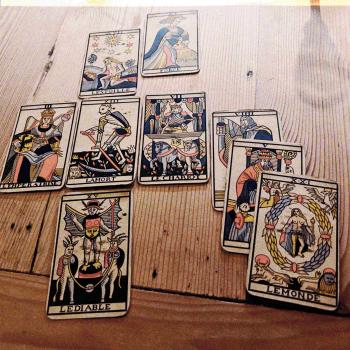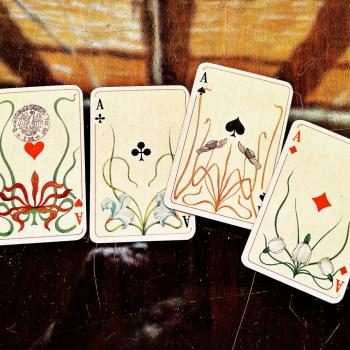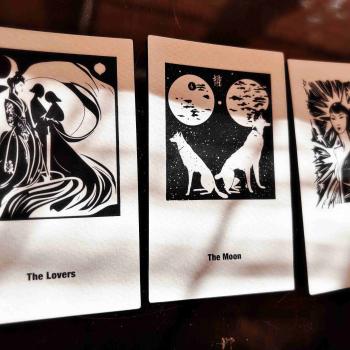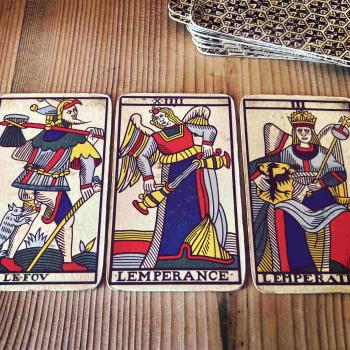‘How do you read so many different decks for the same question?’, people often ask me, expressing the hidden desire to know whether such a universal topic as love, for instance, would be colored by the use of a specific deck of cards. ‘Surely the tone or style must be different,’ they all think, and assume that different decks make us say different things. They assume that as some decks are literal, and others are symbolic they hold a different value for us at the enunciative level. I’ve addressed this assumption elsewhere, but here is a short version of my answer to that question.
It comes as a simple demonstration, based on actual 3-card readings when I have used the following cards:
- An early Marseille Tarot, Jean Noblet, 1650 (trumps)
- The Lenormand cards, which some consider an oracle deck, Ryan Edward’s special edition, Maybe Lenormand, after an old deck from 1880
- A modern tarot, Louttre B Tarot (full deck), 1981
- Regular playing cards (54-card pack), designed by the contemporary Danish Queen (1994) after an old pack from 1770
Let us take this very common question for all 4 readings, followed by a direct answer.
How can I win him back?
1. Jean Noblet Marseille Tarot
Temperance, The Pope, The Empress
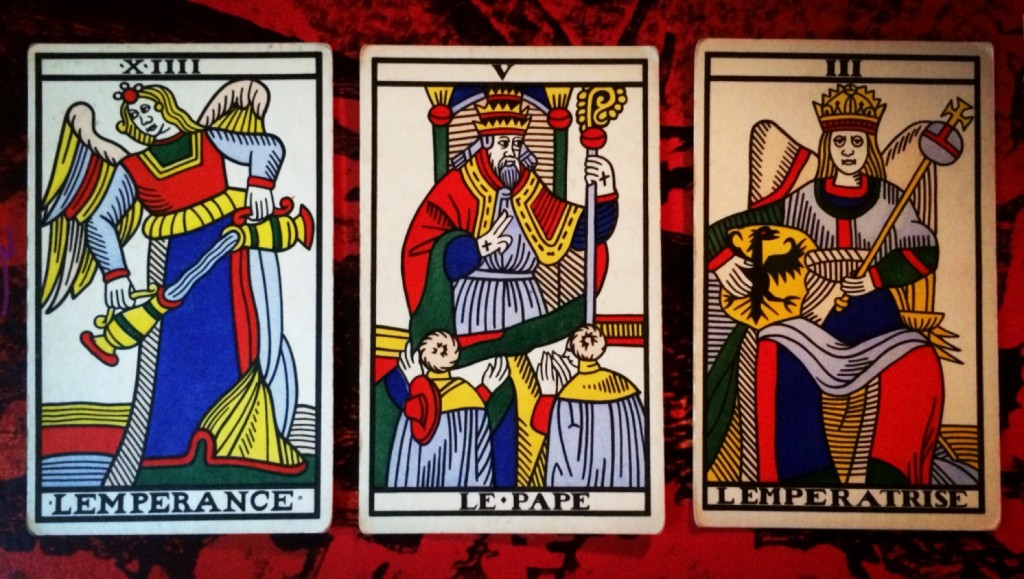
Stop trying too hard. The man is into disciplining you and others sitting at his feet. He shows you the finger. Well, of blessing, but still. A finger is a finger. Are you sure you still want him? If you do, then make sure you strut your own stuff, your regalia, the throne you sit on, and charm. You have power as a Queen. Show him that. You may want to respond to his moral lessons – oh, how trite, for you, but what the heck, you’re not paying me to be judgmental – and perhaps he will start desiring you as the powerful and worldly woman you are. He would be neither the first nor the last righteous pope going after a woman, in spite of himself or the function he fulfils. And yes, the last thing you want to do is patch it up. Playing the temperate party here is not going to get you anywhere.
2. Lenormand
The Sun, The Tower, The Woman
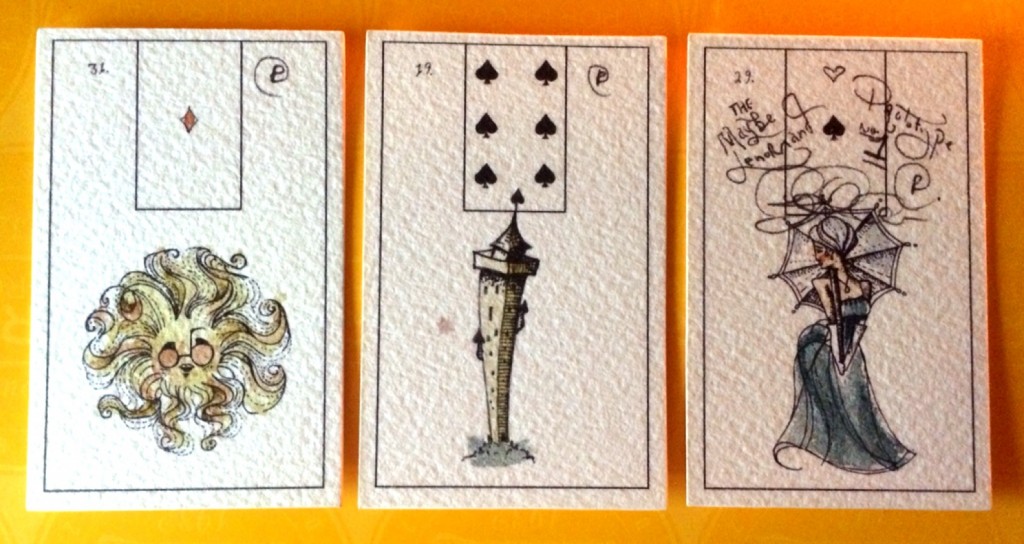
The Sun was shining once. Now its power is concentrated in the light tower. This tall tower is hostile towards you. But to answer your question, if you insist: You can win the man back if you stand tall yourself. Don’t get involved in petty drama. The Tower means serious business. Keep your distance and have a cool countenance.
3. Louttre B Tarot
3 of Swords, The Fool, 3 of Batons
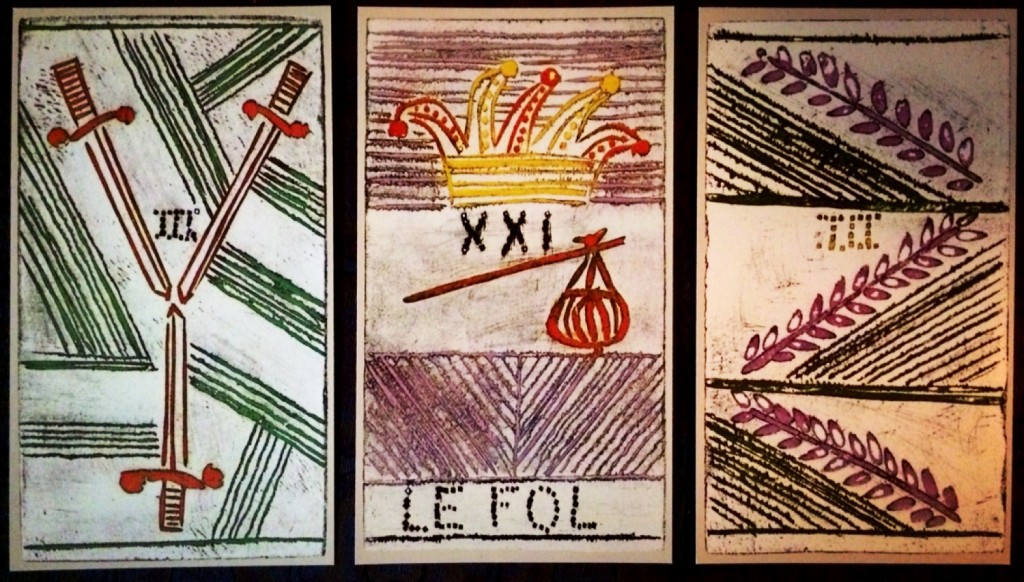
Foolish loss to little avail and gain. If you must win him back, flex your working muscles. Separate the wheat from the chaff, and ignite your crown of success. Fortune favors the Fool, they say. Maybe you get lucky.
4. Playing Cards
Ace of Spades, 3 of Clubs, 4 of Clubs
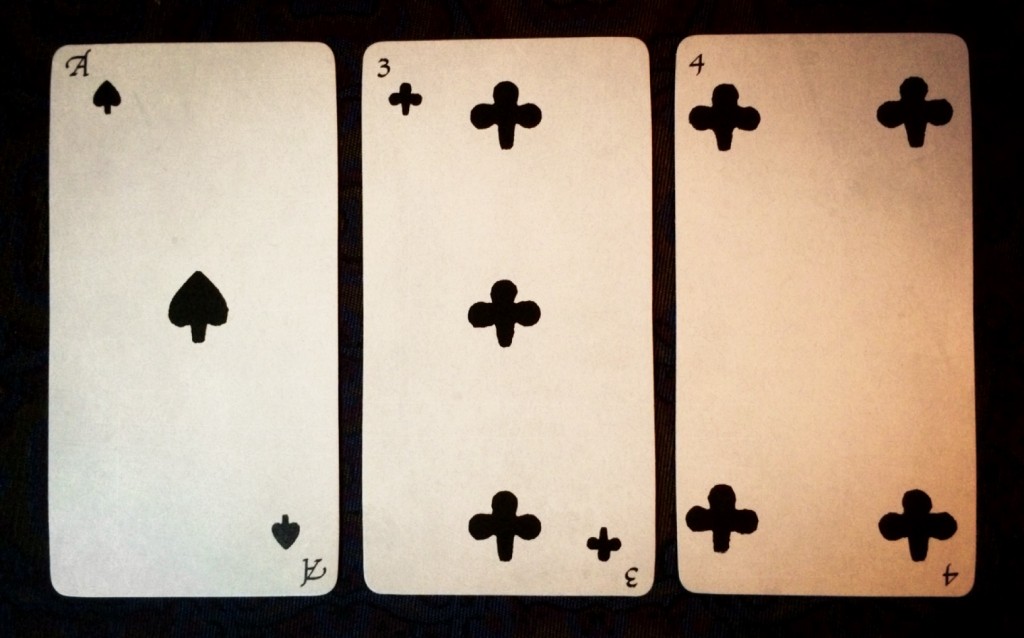
It’s official. The blackness of it all. The bleakness of it all. You are here with the paradox. You can win him back by maintaining the status quo. You can win him back by not winning him back. Death prevails on your desk. You can’t even send him a letter.
Get over Yourself
Now, before I say anything, I have to admit that I never liked this question, as it is fraught with guilt and shame. The nature of this question presupposes that the woman querent did something that has led to the loss of her lover, which she now regrets. But there is little point to shame, guilt, and regret, and the cards consistently offer advice that can be interpreted almost as a gesture of blurting to the woman in pain: ‘Are you serious? Get over yourself, and forget about reconciliation.’
Any reader with some routine will have experienced a similar situation as in my case here, when it is clear that the cards almost refuse to answer the question, offering instead another questing in turn: ‘Are you sure you want to ‘win’ the man back? Is he even worth your effort? There must be a reason why you ‘lost’ him in the first place, and it’s not sure it has something to do with you or your behavior.’
The Story Behind the Question
These reading examples here are almost identical in their implicit answer to the question that seeks pro-active movement. This implicit answer allows for a parallel, and ultimately derailing, story to emerge: ‘You can’t win him back. If you were to win him back, it’s not sure you won’t not discover to your distress that your lover has turned morally righteous and preachy, or indifferent, or mad, or as cold as the grave you last saw him descending into’.
When the cards boldly suggest, ‘You can’t win him back,’ they underlie the structure of what is asked concretely, yet articulated as an act of disavowal: ‘I know I can’t win him back, but still…’ Genius cards. Most righteous cards.
Now, however, I always insist that we must answer the question no matter what, even when we can easily spot the futility of it all before we lay down any cards. This is the reason why the question is important. It gives us a scope and a focus. It makes us exercise our sense of discernment, distinction, and sympathy. In this sense, card readers, like shamans, should never go into the esoteric woods of cartomancy and start performing magic or exorcisms that the querent has not asked for, even when it would be as plain as daylight to anyone witnessing the reading session that such acts may be a very good idea.
Authorization
In my experience, the card reader is better served if she takes the querent’s question at face value, and proceed from there without judgment. Most of the time seekers come to us because they want to situate their faith in a context they can believe in, in spite of themselves. They want a reframing of their reality in such a way that it aligns with what they desire to liberate themselves from. Seekers come to us not just to be empowered, but also to have us empower them.
I often hear about card readers riding moral horses and claiming that the point is for seekers to empower themselves, and not to expect us to do it for them. Indeed they do a good job at effacing themselves to the point that leaves the querent wondering where they’ve gone. When the reader is not ‘present’ morally speaking, the querent faces no threat from the cards, enjoying a feeling of false security. The querent is thus denied the possibility for actual transformation.
I take my role as empowering others seriously, as I have trouble with withdrawing myself from an act of reading for supposed ethical reasons. What is false modesty good for? Does it ever serve anyone? Seekers come to us because they expect us to speak with authority. And so we can speak with authority.
Own Your Voice
Which brings me to making the point I wanted to make with these examples here. A fortuneteller who sounds the same no matter what cards she reads is a fortuneteller who is sovereign in her readings. She owns her own style, tone, and compassion. The method of reading cards is just a tool in her hands. As card readers, we are best when we embody our sovereignty and power; When we own our voice; When say it to anyone interested in knowing our secret: ‘Place any cards in my hands, and I will read your fortunes like you have never heard them before. Cross my palm with silver and get ready for a ride through the tunnel of truth. Eros and Thanatos will crash in you, and you will see the darkness. You will see the light. You will see yourself and the gods you mirror.’
§
For more such readings, teachings, and philosophies, you’re welcome to visit my website.

Patheos Pagan on Facebook.

the Agora on Facebook
The Cartomancer is published bi-monthly on the second and fourth Wednesday here on the Agora. Subscribe via RSS or e-mail!
Please use the links to the right to keep on top of activities here on the Agora as well as across the entire Patheos Pagan channel.






